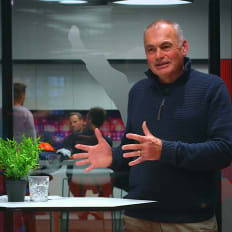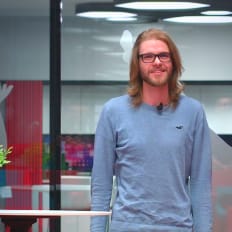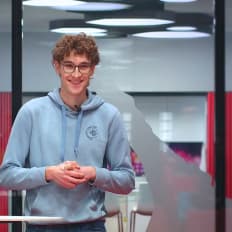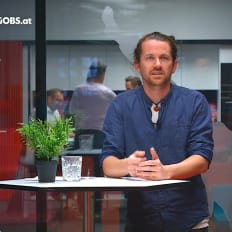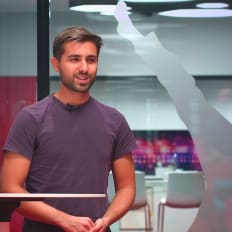
ECO-Soft GmbH
Florian Knoll, Full Stack Developer bei ECO-Soft
Description
Florian Knoll von ECO-Soft beschreibt im Interview das Team des Unternehmens, den Ablauf des Bewerbungsprozesses und gibt Einblicke in die technologischen Challenges.
By playing the video, you agree to data transfer to YouTube and acknowledge the privacy policy.
Video Summary
In "Florian Knoll, Full Stack Developer bei ECO-Soft," Speaker Florian Knoll describes how the eight-person team (four professionals, four trainees) delivers tailor-made, complex software end to end—web and Windows applications, automation via services, and API data exchange—primarily using C#, ASP.NET MVC, WPF, HTML/CSS/jQuery, and XAML. The culture values independence, clear communication, and curiosity; after an application, candidates are invited to interviews and practical trial days to assess team fit, self-directed work, and whether they enjoy the work. Technically, ECO-Soft sticks with its proven .NET stack, is phasing out Visual Basic Application from older projects, and uses Windows services and REST interfaces—offering broad full-stack responsibilities and variety.
Full-Stack with C#: How ECO-Soft’s Team around Florian Knoll leans on ASP.NET MVC, WPF, and clear communication
Takeaways from the session “Florian Knoll, Full Stack Developer bei ECO-Soft” (ECO-Soft GmbH)
In our DevJobs.at techleadstory series, we watched the session “Florian Knoll, Full Stack Developer bei ECO-Soft” by ECO-Soft GmbH and got a refreshingly candid look into a compact, focused software team that delivers end-to-end in C#. ECO-Soft builds “individual, tailor-made software for companies across different industries”—complex, varied, and deliberately full-stack.
Florian sums up the day-to-day dynamic in one line:
“Bei uns wird es im Grunde nie fad.”
ECO-Soft currently has eight employees: four experienced professionals and four in training. The team develops web and Windows applications, automates processes via Windows services, integrates APIs, and moves data through interfaces like REST. The technology base is crystal clear: C#, ASP.NET MVC, and WPF (Windows Presentation Foundation)—plus HTML, CSS, and jQuery for the web and XAML for desktop. This combination shapes the culture: think like a generalist, communicate well, and own the full implementation path.
Small team, big variety: custom software across industries
ECO-Soft is a small company with eight people—“four professionals and four in training.” The mission is unequivocal: build custom software for a wide range of industries. That mission translates into high variety in the project mix. Web apps, Windows apps, service-driven automation, and continuous data exchange through interfaces mean the team constantly faces new domains and problem sets.
“Wir arbeiten sehr individuell, sehr komplex auch und sehr unterschiedlich.”
For engineers, this signals a different rhythm from single-product environments. Requirements and integrations change, while the technology base stays focused. It’s demanding—and that’s exactly where the excitement comes from.
Full-stack as a mindset: frontend, backend, and database belong together
Florian describes how his team operates, with precision:
“[…] arbeiten […] als Full Stack Developer […] müssen wir Frontend machen, müssen wir Backend machen, müssen wir die Datenbank kennen dahinter.”
That full-stack expectation is not just a job title—it’s daily practice. It means understanding the entire chain: HTML/CSS frontends with jQuery, ASP.NET MVC backends, and the database behind it all. Then add desktop applications built with WPF in C# and designed with XAML. If you join ECO-Soft, you work end-to-end, not in isolated layers. That boosts speed, ownership, and quality—because decisions and trade-offs are visible in context.
For many developers, this is appealing: full-stack in a C# ecosystem means going deep in one language and its frameworks, while staying broad across architecture, UI, persistence, interfaces, and automation.
A deliberate stack: ASP.NET MVC, WPF, XAML, and lots of C#
Florian states the technical cornerstones unambiguously:
“Wir arbeiten hauptsächlich mit zwei Systemen, das ist das ASP.NET MVC Framework und das WPF, das Windows Presentation Foundation, also das eine ist die Web-Anwendung und das andere ist die Windows-Anwendung.”
On the web, ECO-Soft uses HTML, CSS, and jQuery—pragmatic, proven building blocks widely deployed in enterprise environments. On Windows desktop, XAML does the heavy lifting for UI definition. And the foundation across all of this is C#:
“Grundsätzlich arbeiten wir ja nur mit der Programmiersprache C-Sharp […].”
Legacy Visual Basic components are being phased out. The team also runs Windows services “for the automation of things” and connects systems through “interfaces, with REST and such,” all on a C# basis.
Why this stack resonates with engineers
- One language to rule the core: C# across web, desktop, services, and integrations reduces context switching.
- Broad applicability: ASP.NET MVC and WPF cover browser and desktop—master both, and you stay versatile.
- Clear UI approaches: jQuery/HTML/CSS for pragmatic web UIs; XAML for expressive Windows interfaces.
- Serious automation: Windows services as durable building blocks for enterprise process automation.
- Integration as muscle memory: REST-based data exchange as day-to-day reality, not an edge case.
This is not about chasing buzzwords. It’s a focused toolset. That clarity is part of the appeal: if you enjoy deepening your C# skills and working within consistent frameworks, ECO-Soft provides a straight line forward.
No routine here: web, Windows, services, and data exchange
“Never boring” is not a throwaway line. ECO-Soft combines several disciplines in its daily flow:
- Building web applications with ASP.NET MVC
- Building Windows applications with WPF
- Automating processes with Windows services
- Working with APIs and interfaces (e.g., REST)
- Integrating and exchanging data between systems
That blend means a project reality where UI work meets integration work—where you wire systems, orchestrate data flows, and design automation as part of the job. It demands the competencies the team prioritizes: self-directed work and solid communication.
Communication and self-reliance: the two pillars
Florian is unequivocal here:
“Bei uns ist die Kommunikation und die Selbstständigkeit einfach am wichtigsten.”
The company looks for people who ask questions, show initiative, and aren’t shy about flagging uncertainty:
“Mir ist auch ganz lieb, dass Fragen gestellt werden und dass man einfach erkundet und sich traut, sozusagen Fragen zu stellen.”
Practically, that means you pick up tasks, structure them, and move them forward while clarifying gaps early—without waiting for micro-management. In a team of this size, it’s not a “nice to have,” it’s a productivity multiplier. Communication holds diverse projects together; self-reliance gets them over the line.
Hiring that fits the team: application, conversation, practice
The path into ECO-Soft is straightforward and honest. Florian describes it like this:
“Normalerweise beginnt es mit einer Bewerbung, wenn die interessant ist, dann […] laden wir […] zu einem Gespräch ein […].”
What really matters is practical insight:
“Ganz wichtig ist für uns einfach, dass man den Bewerber in der Praxis kennenlernt […] und passt er ins Team.”
The starting point is intentionally flexible:
“Normalerweise läuft es bei uns ganz spontan, also es bewirbt sich wer und dann schauen wir mal, ob wir jemanden brauchen, ob wir überhaupt noch einen Platz haben.”
The message is clear: fit matters more than managing a long requisition list. If you show up with the right attitude, curiosity, and matching skills, you’ll likely go from conversation to a practical tryout—so both sides can see how the collaboration feels.
What ECO-Soft expects—and what you gain
From the session, the expectations are crisp:
- Self-reliance: take ownership, structure work, and drive it forward.
- Communication: ask questions, surface options, and make progress visible.
- Full-stack fluency: think frontend, backend, and database as one flow.
- C# focus: enjoy C# and be ready to go deep.
- Stack affinity: ASP.NET MVC on the web, WPF/XAML on desktop, plus HTML/CSS/jQuery.
- Integration mindset: APIs, REST, and Windows services for automation as part of your toolbox.
Why is that compelling? Because ECO-Soft provides the stage for it:
- Variety: “Very individual, complex, and different” projects stretch your thinking.
- End-to-end ownership: full-stack means you shape the full architecture, not just a slice of it.
- Consistent technology focus: C# across layers reduces friction and accelerates expertise.
- Practical entry: the hands-on step makes the actual work style visible, early.
For many engineers, that’s the ideal learning and impact curve: a focused stack, broad responsibilities, and genuine ownership.
Learning in motion: four in training, four professionals
With four in training and four professionals, everyday knowledge transfer is baked in. While Florian doesn’t outline a formal program, the team’s makeup suggests that learning is part of daily work. When you join, you won’t just pick up tools—you learn to think across system boundaries.
It’s also clear that learning curves are expected. This isn’t about repeating patterns; it’s about solving problems independently. The explicit invitation to “ask questions” aligns with that: understanding deeply and challenging assumptions is how you move fastest in this setup.
The engineering principles we distilled from the session
Without buzzwords or slides, Florian offered a sharp view of ECO-Soft’s engineering. From his remarks, these principles emerge:
- Consistency over tool sprawl: C# as the common base across web, desktop, services, and integrations.
- End-to-end responsibility: frontend, backend, and database are a single continuum—full-stack is the default.
- Pragmatic UI choices: jQuery, HTML, and CSS—solid, widely understood, and effective.
- Desktop is first-class: WPF/XAML as a dedicated strength for Windows applications.
- Automation as product DNA: Windows services are core components, not side processes.
- Integration as routine: REST and interface work are everyday practice, not exceptions.
- Culture over ceremony: communication, self-reliance, and practical tryouts matter more than heavy process docs.
These principles fit together. They enable speed without sacrificing quality and empower a small team to deliver.
What your role looks like as a developer at ECO-Soft
You will…
- Solve diverse problems—spanning UI, business logic, and data models.
- Combine technologies—ASP.NET MVC in the browser, WPF/XAML on desktop, C# in services.
- Integrate interfaces—exchange data via REST and connect systems.
- Build automation—design and run Windows services for recurring tasks.
- Take ownership—work independently while communicating closely.
If that combination excites you, you align with the described work style. And you’ll appreciate the practical selection step—where both sides get to see the reality of the collaboration, not just what’s on paper.
Collaboration in practice: questions welcome, clarity expected
“Asking questions” is explicitly encouraged at ECO-Soft. That’s more than a slogan: integration-heavy projects always conceal uncertainty—data formats, interface semantics, ownership. Asking early prevents late errors. Open communication makes decisions traceable—especially where web, desktop, services, and external APIs meet.
Self-reliance does not mean solving problems alone in a vacuum. It means recognizing, prioritizing, and initiating the right work—and then clarifying what’s needed with the team. That’s exactly how small, effective teams operate.
Modern skills—applied pragmatically
ECO-Soft’s choice of technologies feels deliberate: no “tool of the day,” but stable, well-understood frameworks with strong communities. That fits heterogeneous industry contexts. ASP.NET MVC and WPF aren’t about hype; they’re about maintainability, productivity, and delivery. If you join, you’ll sharpen skills widely valued in business applications: clean MVC patterns, robust WPF UIs, reliable services, and solid interfaces.
The fact that Visual Basic components from older projects are being phased out also shows the trajectory: consolidation on C# as the strategic code base. That reduces fragmentation in code maintenance and increases focus on common standards.
Application tips we heard in the session
- Show full-stack: demonstrate how you think across frontend, backend, and databases.
- Talk about C#: your experience and where you want to grow.
- Evidence communication: examples where you proactively asked questions and clarified scope.
- Showcase practice: small demos or repos in ASP.NET MVC, WPF, or Windows services.
- Stay authentic: the team wants to “get to know you in practice”—authenticity beats perfect slides.
These points flow directly from Florian’s description of ECO-Soft’s selection process and team culture.
Reasons why tech talent should consider ECO-Soft
- Varied work: move between web, desktop, services, and interfaces—and keep learning.
- C# as the common thread: a cohesive stack with less context switching and deeper expertise.
- Ownership over silos: full-stack means you shape end-to-end architecture.
- Clear expectations: communication and self-reliance are lived standards, not buzzwords.
- Realistic selection: practical tryouts, so both sides understand the collaboration.
- Team size with impact: eight people translate into short paths, direct alignment, and visible contribution.
All of this follows directly from the session—no embellishment, just a clear message: if you like C# and want to live full-stack, this is the right environment.
Quote highlights from the session
“Bei uns wird es im Grunde nie fad.”
“Ganz wichtig ist für uns einfach, dass man den Bewerber in der Praxis kennenlernt […].”
“Bei uns ist die Kommunikation und die Selbstständigkeit einfach am wichtigsten.”
“Wir arbeiten hauptsächlich mit zwei Systemen, das ist das ASP.NET MVC Framework und das WPF […].”
“Grundsätzlich arbeiten wir ja nur mit der Programmiersprache C-Sharp […].”
“[…] arbeiten halt auch mit Schnittstellen, mit Rest und solche Sachen, aber alles auf C-Sharp-Basis.”
These lines condense ECO-Soft’s essence: variety, practical evaluation, responsibility, and a coherent technology path.
Conclusion: A strong home for full-stack C# engineers
The session “Florian Knoll, Full Stack Developer bei ECO-Soft” shows a team operating with small size and clear architecture: C#, ASP.NET MVC, WPF, Windows services, and REST—powered by a culture of self-reliance and open communication. If you enjoy building real software across different industries, this is that rare balance of variety and focus. The hiring path is deliberately pragmatic: conversation first, practice second—and ultimately, mutual fit.
Our impression: ECO-Soft is a place for people who want ownership, who like diving into complex contexts, and who appreciate the value of a consistent stack. “Never boring” isn’t just a phrase here—it’s a working promise that follows from the team’s structure and technology choices.
More Tech Lead Stories
More Dev Stories
ECO-Soft GmbH Bastian Schmidt, Software Developer bei ECO-Soft
Bastian Schmidt von ECO-Soft redet in seinem Interview von seinem Werdegang als Developer – von den frühen Anfängen, bis hin zur aktuellen Arbeit als Developer – und welche Tipps er für Anfänger hat.
Watch nowECO-Soft GmbH Ricardo Reindl, Software Developer bei ECO-Soft
Ricardo Reindl von ECO-Soft erzählt in seinem Interview von den spielerischen Anfängen während der Schulzeit und über seinen weiteren Werdegang bis zum Software Development – und was das Wichtigste für Neueinsteiger ist.
Watch nowECO-Soft GmbH Tobias Hafner-Fuchs, Full Stack Developer bei ECO-Soft
Tobias Hafner-Fuchs von ECO-Soft spricht im Interview über seine Anfänge im Programmieren, was seine Aufgaben als Full Stack Developer im Team umfassen und gibt Empfehlungen für Einsteiger.
Watch nowECO-Soft GmbH David Kandler, Software Developer bei ECO-Soft
David Kandler von ECO-Soft spricht in seinem Interview davon, wie er seinen beruflichen Wechsel ins Software Development durchgezogen hat, wie er im Unternehmen gestartet hat und welche Tipps er für Beginner geben kann.
Watch now

